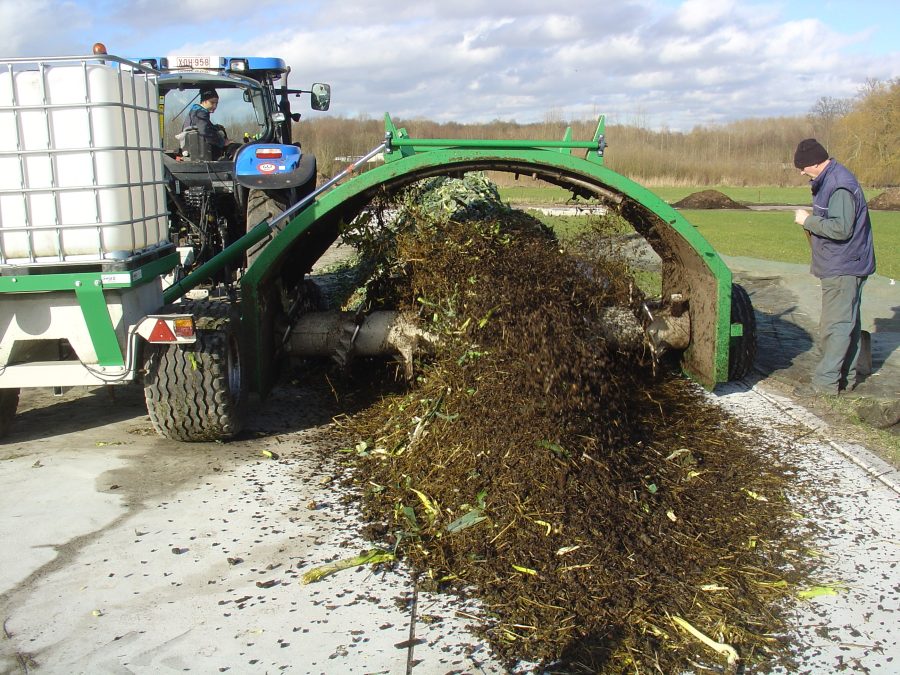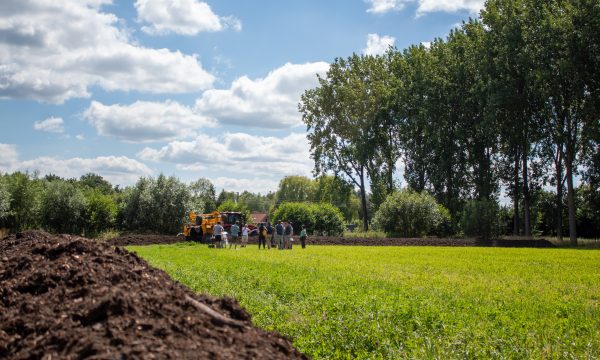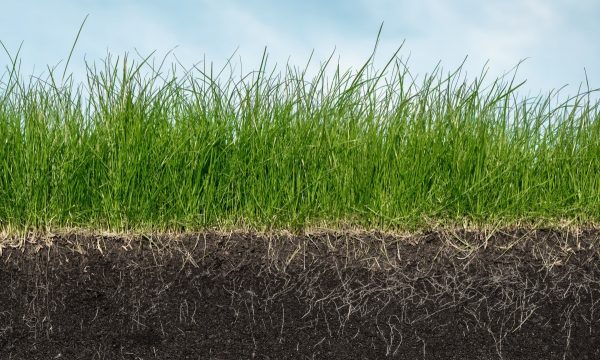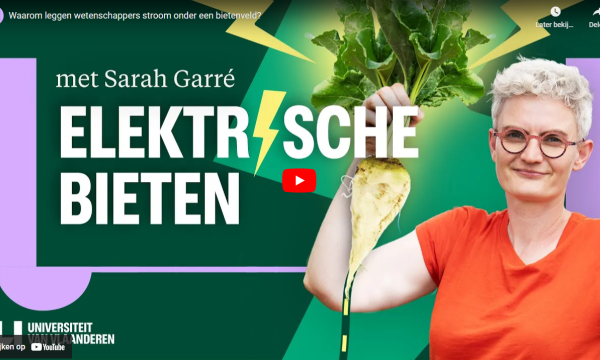Press release ILVO expands compost site and points to potential of compost

ILVO has completed a new construction: Part Two of the compost site. It is a covered storage area with compartments for starting material and for finished compost. "This second and last construction phase of the compost site which represented an investment of more than €500,000", says Evy De Vlieghere, construction engineer at ILVO.
"The concrete floor is impermeable and equipped with a system to absorb fluid losses, mostly from wet output material, which is required by Vlarem II. The roof separates this drain from rainwater. We can now store and reuse 50,000 liters of waste water in the composting process, for re-humidification of the compost piles."ILVO holds a unique position in Flanders in the research on farm composting. Fifteen years of research and four multiannual field trials show the potential of compost as a soil improver. Compost expert Koen Willekens: "Compost increases or maintains the organic matter, reduces soil acidification, brings together all the necessary plant nutrients with a low risk of outwashing and promotes soil life, which makes the soil more resilient to disease over time. All of this easily leads to a measurement of 15% more crop yield (harvest) on composed fields, compared to other soil improvers such as barnyard manure."
Compost increases or maintains the organic matter, reduces soil acidification, brings together all the necessary plant nutrients with a low risk of outwashing and promotes soil life, which makes the soil more resilient to disease over time.
A full-fledged infrastructure
The first construction phase of the compost site – a 30 cm thick impermeable concrete platform in open air, under slope (2%) and with a separate reception of rainwater and effluent – dates from 2014. This second phase joins seamlessly to the first. ILVO now has a full-fledged infrastructure to work according to the state of the art and the legal guidelines to make ripe and biologically rich compost from organic residual streams. ILVO is licensed to work with all possible plant waste streams, and also with solid animal manure products, including those derived from manure digesters. "From now on, when researching recipes and the quality differences of compost, we can keep the starting materials separate even better than before. This is important for the proper mixing and measuring of the composts made in our studies," says compost researcher Koen Willekens.
15 years of compost research and ‘soil, soil, soil’
In its plant sciences research, ILVO has been focusing on soil quality and sustainable soil improvement for a long time. "Soil, soil, soil’ has become a slogan in which the soil researchers play the first violin," says Administrator-General Joris Relaes at the official opening. We are asking a lot from our agricultural soils with our highly productive agriculture. But we must also take good care of it: a humus-rich building layer with good water and air management, the right nutrient balance and a healthy soil life. That doesn’t come by itself."
ILVO is a leader in Flanders for the research on farm composting. In order to quantify the effects of compost on soil quality and yield, you need long-term field tests – more than in other types of fertilization. Of these long-running experiments with farm compost – with treatments up to 10 years in a row – there are now four either finished or ongoing, both in organic and conventional cultivation systems.
In the meantime, it has been demonstrated that compost is the best soil improver compared to other forms of fertilization. It is certainly possible to achieve 15% more revenue, in addition to all the other capital values. Because repeated compost application on an agricultural soil:
- Increases or maintains the organic matter content (humus enhances the preservation of moisture and nutrients, a better soil structure, in favor of better rooted crops,...)
- Has a known value (buffers or increases the pH) that allows the farmer to save on chalky soil improvers
- Promotes beneficial soil organisms (bacteria, fungi, good nematodes, etc.). A more active and diverse soil life increases the disease resilience of the soil, which can result in a lower need for plant protection products.
- Brings the whole range of plant nutrients into the soil, but with a lower risk of losses than during and after the application of some manure products. ILVO also showed that repeated application of compost does increase the phosphorus reserve in a soil and that is already high – often too high – on some plots.
Watch the video about compost at ILVO below


